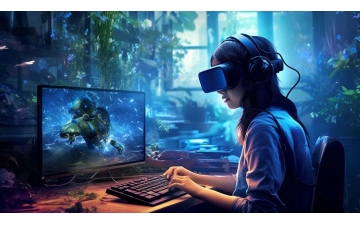Gaming technologies have reached a point where they will virtually revolutionize the rapidly evolving digital world. The combination of developing art...
See more

Artificial intelligence (AI) has truly evolved in recent years, and today's situation has brought revolutionary changes to many areas. Here are some key points where AI has made significant progress:
1. Language Processing and Speech Recognition:
• Language models like ChatGPT have advanced significantly in understanding and producing human language. They achieve near-human-level success in tasks such as text generation, conversation, language translation, summarization, and written content editing.
• Voice assistants: Voice assistants like Siri, Google Assistant, and Alexa have made significant advances in understanding natural language interaction and speech.
2. Image Recognition and Processing:
• Image classification and object recognition: AI has reached very advanced levels in image processing. For example, Google Lens and similar applications can recognize objects and text in photos.
• Facial recognition: Facial recognition technology is widely used in security and personal assistant applications.
3. Autonomous Vehicles and Robots:
• Autonomous vehicles: Tesla and other automotive companies are using advanced artificial intelligence and machine learning algorithms to make their vehicles driverless.
• Robots: Advanced robots have made significant advances in human-like movements and environmental adaptation. Robots are actively used, particularly in industrial production lines.
4. Use of AI in Healthcare:
• Disease diagnosis: Artificial intelligence helps human doctors identify diseases by analyzing medical images. Significant advances have been made in various areas, such as cancer, heart disease, and brain diseases.
• Drug development: AI accelerates drug discovery and development, helping to find new treatments.
5. Artificial Intelligence and Creativity:
• Art, music, literature: AI has begun to be effectively used in creative fields such as artistic creation. For example, AI-powered tools can be used in creative processes such as composing music, painting, and even writing.
• Visual production tools like DALL·E: AI has made significant strides in generating not only text-based but also visual content. Users can create entirely new visuals by annotating them with text.
6. Machine Learning and Deep Learning:
• Data analysis: AI algorithms can analyze large data sets and draw meaningful inferences from them. This provides significant benefits in business, in areas such as financial forecasting, marketing strategies, and customer behavior.
• Deep learning: Deep learning methods have become much more efficient, especially when working with big data, and have found application in many industries.
7. Ethical and Security Issues:
• The rapid development of AI brings with it ethical issues. Issues such as personal data security, workforce displacement, and bias are particularly hotly debated. The need for transparent and fair use of AI has become a frequently emphasized issue.
8. Generative AI and Creative Applications:
• Generative modeling: Generative AI tools like GPT-4, DALL·E, and Stable Diffusion continue to revolutionize creative content creation. These tools can generate content in a wide variety of media formats, including text, images, and video.
• Deepfake: On the other hand, this technology is also vulnerable to malicious use. Techniques like Deepfake can be used to create fake videos and audio, raising security concerns.
In conclusion, AI has made significant advances in many areas and is being integrated into more and more sectors. However, societies still face several ethical and security challenges regarding the potential impacts of these developments. While the future of AI is very exciting, it clearly needs to be developed carefully and responsibly.
THE CURRENT POINT OF ARTIFICIAL INTELLIGENCE IN THE DIGITAL GAME WORLD
Artificial intelligence (AI) has undergone a tremendous evolution in the digital gaming world and continues to evolve. AI's role in games encompasses much more than simply controlling opponents. Here are some key points where AI has made significant progress in the gaming world:
1. More Intelligent NPCs (Non-Player Characters):
While NPCs used to follow specific paths and react with limited actions, AI has become much more sophisticated today. For example, enemies can now analyze the player's movements and make tactical changes accordingly. This provides a more challenging and dynamic gaming experience for players.
• Example: In games like The Last of Us, enemies can scan the environment, hide, coordinate in groups, and develop various strategies.
2. Dynamic Game Worlds:
AI allows the environment and elements in open-world games to be more dynamic and realistic. Environmental factors can influence the behavior of characters, and these can change based on the player's actions.
• Example: In Red Dead Redemption 2, weather conditions, animal behavior, and the daily lives of NPCs are shaped by the player's actions.
Their daily lives are shaped by the player's actions.
3. In-Game Storytelling:
AI can make in-game storytelling more interactive. Player choices can change not only the main story but also side quests and the reactions of the game world. Such interactions offer the player a more independent experience.
• Example: In Detroit: Become Human, player decisions can take the story on a completely different path, and these decisions can have different outcomes throughout the game.
4. Machine Learning and Adaptive Difficulty:
Some games use machine learning to analyze the player's play style and adjust the difficulty accordingly. This ensures players always have an enjoyable yet challenging experience.
• Example: In Alien: Isolation, the Xenomorph's behavior changes based on how the player moves. If the player consistently uses stealth, the creature becomes more cautious.
5. Realistic Voice and Speech Recognition:
Some games use AI advanced enough to respond to the player's voice commands. This provides greater interaction, especially in action or strategy games.
• Example: In games like StarCraft II, players can strategically direct units with voice commands.
6. Better Emotion Recognition and Responses:
AI is also beginning to appear in games that can analyze players' emotional states. This allows for deeper interaction, especially in story-based games, as NPCs' emotional responses are shaped by the player's mood.
• Example: In games like L.A. Noire, you can tell whether characters are lying by their facial expressions. AI uses facial recognition technology to generate realistic emotional responses.
7. AI-Based Player Characters:
AI can make not only opponents but also player characters more intelligent. For example, in team-based games (e.g., Overwatch, Rainbow Six Siege), AI-powered characters can cooperate with other players, develop strategies, and act effectively as part of a team.
8. Complex Simulations and Game Worlds:
AI has become quite powerful in simulating elements such as physics and economics. This allows for the creation of real-world systems within the game world.
• Example: Games like SimCity and Civilization utilize AI's computational power to manage cities and civilizations while managing ecosystems, economic balances, and political decisions.
9. Artificial Intelligence and Game Design:
Artificial intelligence is beginning to be integrated into game design itself. AI is used in the game design process to create new levels, maps, and enemy types. This allows game designers to create a much larger game world.
• Example: In games like No Man's Sky, procedurally generated AI algorithms are used to make each planet unique.
10. Game Personalization:
AI can tailor the gaming experience to personal preferences. Based on players' in-game choices, characters' behaviors in the game world can change. This makes games more meaningful and special for players.
Ultimately, AI's place in the digital gaming world isn't limited to creating smarter opponents; it's also enabling the game world itself to become more dynamic, interactive, and in-depth. With the advancement of AI technology, games offer a much richer experience, and it will be exciting to see where this evolution will lead in the future.

Gaming technologies have reached a point where they will virtually revolutionize the rapidly evolving digital world. The combination of developing art...
See more

Today’s game worlds are no longer limited to handcrafted maps or pre-designed levels. Thanks to a technique called Procedural Generation, entire world...
See more